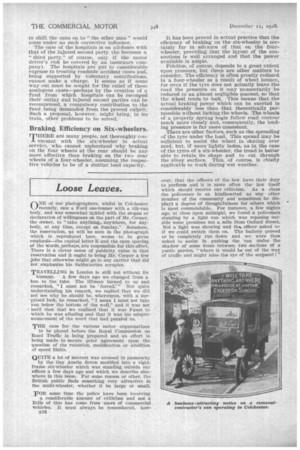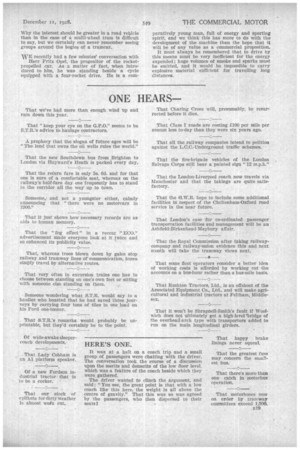Loose Leaves.
Page 2

Page 3

If you've noticed an error in this article please click here to report it so we can fix it.
d'ANE of our photographers, whilst. in Colchester L_Irecently, saw a Ford one-tonner with a tilt-van body, and was somewhat tickled With the slogan or declaration of willingness on the part of Mr. Cooper, the owner, to "take anything,, anywhere, for anybody, at any time, except on Sunday." Somehow, the reservation, as will be seen in the photograph which is reproduced here, seems to be given empliasishe capital letter E and the open spacing of the words, perhaps, are responsible for this effect. There is a clever sense of publicity .value in that reservation and it ought to bring Mr. Cooper a few jobs that otherwise might go to any carrier that did not emphasize his Sabbatarian scruples.
TRAVELLING in London is still not without its humour. A few days ago we changed from a bus to the tube. The liftman turned to us and remarked, "I must not be ' forced.' " Not quite understanding his remark, we replied that we did not See why he should be, whereupon, with a surprised look, he remarked, "I mean I must not take you below the bottom of the welt!' and it was not until then that we realized that it was Faust to which he was alluding and that it was his mispronouncement of the word that had puzzled us.
THE case for the various motor organizations to be placed before the Royal Commission on Road Traffic is being prepared and an effort is being made to secure prior agreement upon the question of the retention, modification or abolition of speed
QUITE a lot of interest was aroused in passers-by . by the tiny Austin Seven modified into a rigidframe six-wheeler which was standing outside our offices a few days ago and which we describe elsewhere in this issue. For some reason or other, the 13ritish public finds something very attractive in the multi-wheeler, whether it be large or small.
FOR some time the police have been receiving a considerable amount of criticism and not a little of this has come from users of commercial vehicles. It must always he remembered, how
• .1.8
ever, that the officers of the law have their duty to perform and it is more often the law itself which should receive our criticism. As a class the policeman is as kindhearted as any other member of the community and sometimes he dispIayS a degree of thoughtfulness for others which is most commendable. For instance, a few nights ago, at close uponmidnight, we found a policeman standing by a light van which was reposing outside some premises not a mile from Oxford Street Not a light was showing and th4,. officer asked us if we could switch them on. The battery proved to be completely run down and we were then asked to assist in pushing the van under the shadow of some trees between two sections of a public garden, "where it would be out of the way of traffic and might miss the eye of the sergeant !"
Why the interest should be greater in a road vehicle than in the case of a multi-wheel tram is difficult to say, but we certainly can never remember seeing groups around the bogies of a tramcar..
WE recently had a few minutes' conversation with
Herr Fritz Opel, the progenitor of the rocketpropelled ear. As a matter of fact, when introduced to him, he was standing beside a cycle equipped with a four-rocket drive. He is a corn
paratively young man, full of energy and sporting spirit, and we think this has more to do with the development of the machine than the hope that it will be of any value as a commercial proposition.
It must always be remembered that to drive by this means must be very inefficient for the energy expended ; huge volumes of smoke and sparks must be emitted, and it would be impossible to carry explosive material sufficient for travelling long distances.






























